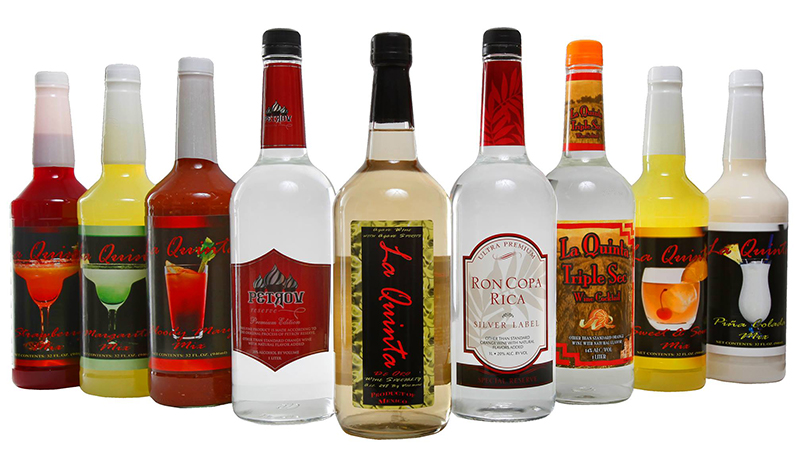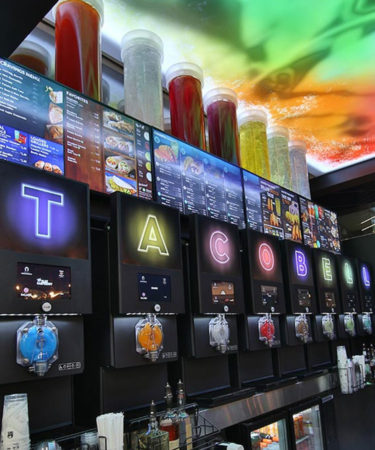When three Taco Bell Cantina locations launched in New York City in 2018, taco lovers came running. The bell had rung, and we were thirsty.
“My new favorite Hell’s Kitchen drink is a $6 Baja Blast [slushie] with a generous shot of vodka,” Eric T., a Yelp user, wrote. Vice called the 8th Avenue Cantina the “coolest place to get a drink in Midtown Manhattan,” and Business Insider touted the Cantina’s “trendy decor, shareable tapas-style menus, and alcoholic drinks like frozen Margaritas and local beer.”
Who could blame them? A frozen Margarita is a worthy pairing for any Gordita Crunch loyalist, and at less than $7 for a 16-ounce drink, it’s a deal that’s hard to beat this close to Penn Station.
Yet on a recent visit to the very same Taco Bell Cantina, this author was perplexed to discover the alcohol options for spiking said frozen Margarita were not liquor, but lower-alcohol imposters. Instead of bona fide spirits, the touch-screen menu offered fermented vodka, fermented rum, and agave wine.

You might be wondering why this caused alarm. All vodkas and rums are “fermented,” aren’t they? Indeed they are, but in the case of vodka, rum, tequila, or any spirit, stopping at fermentation misses one crucial step: distillation. “Fermented liquor,” by both booze production and legal standards, is considered wine, not hard liquor.
Taco Bell Cantina’s fermented spirits come from San Gabriel Beverage Group, a Southern California producer and distributor specializing in non-distilled vodka, rum, and tequila. The group’s products include Petrov Reserve, a 20-percent-ABV, gluten-free “vodka” that “enables establishments with beer and wine licenses to offer their own signature line of Cosmopolitans, Kamikazes, Bloody Marys, Martinis, or any vodka-based cocktail.” Ron Copa Rica, its 20-percent-ABV “rum,” offers a half-proof option for Piña Coladas, Mojitos, and Daiquiris.
La Quiere de Oro, perhaps the most legitimate of the three, is an agave wine produced similarly to tequila before distillation: The 100 percent Blue Weber Agave wine, available at 17 percent, 20 percent, and 24 percent ABV, offers “a low-calorie alternative to distilled tequila.”
This is all well and good for those seeking low-alcohol, low-calorie options to pair with their quesadillas, but is this what the average Taco Bell consumer ordering 16-ounce alcoholic slushies is looking for? Probably not.
Interestingly, the half-proof Cantina cocktails appear to be an NYC-only phenomenon. Other Cantina locations are reportedly serving traditional spirits in their drinks. When the world’s first Taco Bell Cantina debuted in Chicago in 2015, Chicagoist tasted its Mountain Dew Baja Blast With Ketel One Vodka; Cantina Punch with Captain Morgan White Rum; and Cantina Margarita with Don Julio Tequila.
At the Alexandria, Va., location, launched in 2018, the Mountain Dew Baja Blast Twisted Freeze came with a choice of Tito’s Vodka, Bacardi Rum, or Jose Cuervo Tequila.
The Cantina Menu posted on the Taco Bell website proudly lists dozens of domestic, Mexican, and American craft beer brands. Yet the official liquor list is contrarily short and vague, listing only unbranded 80-proof rum, vodka, and tequila. In small, grayscale print under the big, bold “Cantina Menu” title is the faint disclaimer: “At participating locations only.” Nowhere is there mention of the fermented faux-spirits that serve as the only booze options for Cantina-goers in NYC.
Why would Taco Bell do this? The answer is fairly, if unjustly simple: It’s a liquor license workaround. By selling fermented beverages that taste and act like spirits, establishments with beer and wine licenses, but not liquor licenses, can sell “cocktails.” The restaurant makes money on its “affordable” drinks, and the customer is none the wiser.
VinePair reached out to Taco Bell, San Gabriel Beverage Group, and other representatives for this story. None responded to requests for comments.
